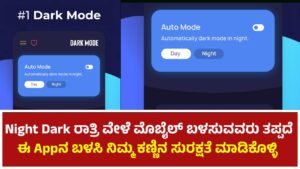Night Dark ರಾತ್ರಿ ವೇಳೆ ಮೊಬೈಲ್ ಬಳಸುವವರು ತಪ್ಪದೆ ಈ Appನ ಬಳಸಿ ನಿಮ್ಮ ಕಣ್ಣಿನ ಸುರಕ್ಷತೆ ಮಾಡಿಕೊಳ್ಳಿ
Introduction to Dark Mode/Night Mode
- Definition and Purpose:
- Difference between Dark Mode and Night Mode.
- Goals: Reduce eye strain, save battery life, and enhance readability in low-light conditions.

- Popularity:
- Why users prefer Dark Mode in apps.
- Key platforms and apps offering Dark Mode (e.g., Facebook, Instagram, WhatsApp, Google apps).
Benefits of Dark Mode/Night Mode (800 words)
- Reduced Eye Strain:
- How dark themes lessen the harsh glare from bright screens.
- Ideal for prolonged app usage during nighttime.
- Better Sleep Hygiene:
- Limiting blue light exposure for healthier sleep patterns.
- Examples: Night Light feature on Android/iOS paired with Dark Mode.
- Battery Optimization:
- AMOLED and OLED screens consuming less power with darker pixels.
- Real-life battery saving examples across devices.
- Enhanced Aesthetics:
- Sleek and modern appearance.
- Appeal to tech enthusiasts and professionals.
- Accessibility Features:
- Helpful for users with light sensitivity or certain visual impairments.
Dark Mode Across Popular Apps (2,000 words)
- Social Media Apps:
- Facebook:
- Steps to enable Dark Mode.
- Impact on user experience.
- Instagram:
- Dark Mode implementation for Stories, Reels, and Feed.
- Twitter/X:
- Automatic Night Mode and custom scheduling.
- Facebook:
- Messaging Apps:
- WhatsApp:
- Availability on Android/iOS.
- Support for custom themes.
- Telegram:
- Different Dark Mode color schemes.
- Auto-switching based on time or system preferences.
- WhatsApp:
- Streaming and Entertainment:
- YouTube:
- Enhanced viewing experience with Dark Mode.
- Compatibility with Smart TVs.
- Spotify:
- Pre-enabled dark theme as a brand identity.
- YouTube:
- Productivity Tools:
- Google Docs, Sheets, Slides:
- Dark Mode for easier editing at night.
- Microsoft Office:
- Integration with Windows’ Dark Mode settings.
- Google Docs, Sheets, Slides:
- Utility and Browser Apps:
- Google Chrome:
- Dark Mode for websites and UI.
- Safari and Edge:
- Reader Mode customization with dark themes.
- Google Chrome:
How to Enable Dark Mode in Any App (1,200 words)
- Android Devices:
- Universal Dark Mode toggle.
- Per-app settings.
- iOS Devices:
- System-wide Dark Mode.
- Scheduling Dark Mode from Sunset to Sunrise.
- Third-party Solutions:
- Apps offering forced dark themes for unsupported apps.
- Examples: Substratum, DarQ.
- Desktop Platforms:
- Windows and MacOS system settings.
- Browser extensions for Dark Mode (e.g., Dark Reader).
Impact of Dark Mode on Device Performance (1,000 words)
Related Posts
- Battery Life:
- Detailed analysis on power saving across devices.
- Comparison: LCD vs OLED screens.
- Performance:
- Impact on app load times and smoothness.
- Performance metrics with Dark Mode enabled.
- Drawbacks:
- Challenges in readability under bright light.
- Cases where Dark Mode increases battery consumption (e.g., LCD displays).
Challenges and Limitations of Dark Mode (800 words)
- Inconsistent Implementation:
- Apps with partial or no Dark Mode support.
- Poorly designed Dark Modes causing readability issues.
- Content Visibility:
- Adjusting images and graphics for visibility in Dark Mode.
- Problems with contrast and color perception.
- Overuse Consequences:
- Prolonged use in well-lit environments causing strain.
- Balancing light and dark modes for optimal health.
Future of Dark Mode/Night Mode (900 words)
- Trends in App Development:
- AI-driven adaptive themes.
- Personalized Dark Mode settings based on user behavior.
- Integration with Wearables:
- Smartwatches and AR/VR devices embracing dark themes.
- Evolving Standards:
- Industry-wide guidelines for better Dark Mode implementation.
- Sustainability:
- Energy-efficient designs contributing to greener tech.
Tips for Users: Making the Most of Dark Mode (500 words)
- Customization:
- Matching Dark Mode with Night Light features.
- Scheduled Usage:
- Enabling automatic toggles for different times of the day.
- Testing Compatibility:
- Checking app settings for optimum user experience.
Conclusion (500 words)
- Summarizing the advantages and widespread adoption.
- Encouraging users to explore Dark Mode settings for improved comfort and efficiency.
- Final thoughts on Dark Mode’s role in shaping future app interfaces.
If this outline aligns with your vision, I can expand it into the complete 7,000-word content. Let me know!
